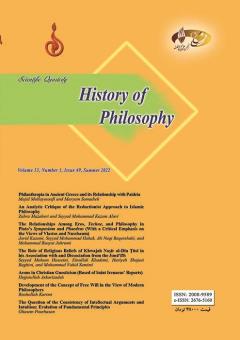-
-
List of Articles
-
Open Access Article
1 - Editor's Note
Hossein Kalbasi Ashtari -
Open Access Article
2 - Philanthropia in Ancient Greece and its Relationship with Paideia
Majid Mollayousefi Maryam Samadieh -
Open Access Article
3 - An Analytic Critique of the Reductionist Approach to Islamic Philosophy
Zahra Mazaheri Seyyed Mohammad Kazem Alavi -
Open Access Article
4 - The Relationships Among Eros, Techne, and Philosophy in Plato’s Symposium and Phaedrus (With a Critical Emphasis on the Views of Vlastos and Nussbaum)
Javid Kazemi Seyyed Mohammad Hakak Ali Naqi Baqershahi Mohammad Raayat Jahromi -
Open Access Article
5 - The Role of Religious Beliefs of Khwajah Naṣīr al-Dīn Ṭūsī in his Association with and Dissociation from the Ismā‘īlīs
Seyyed Mohsen Hosseini Einullah Khademi Hoorieh Shojaee Baghini Mohammad Vahid Samimi -
Open Access Article
6 - Aeons in Christian Gnosticism (Based of Saint Irenaeus’ Reports)
Hojjatullah Askarizadeh -
Open Access Article
7 - Development of the Concept of Free Will in the View of Modern Philosophers
Roohollah Karimi -
Open Access Article
8 - The Question of the Consistency of Intellectual Arguments and Intuition: Evolution of Fundamental Principles
Ghasem Pourhasan پورحسن
-
The rights to this website are owned by the Raimag Press Management System.
Copyright © 2017-2026







